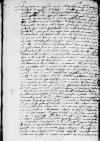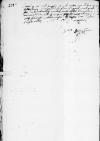Letter #1708
Ioannes DANTISCUS to Tiedemann GIESELöbau (Lubawa), 1537-09-1[3]
English register: Dantiscus informs Giese about the return of the royal chamberlain (Marcin Wolski) with good news (on the election of the Warmia bishop). He encloses the letters he has received for Giese’s perusal. The arrival of royal envoy Mikołaj Nipszyc in Lubawa is expected within four days. Next, Nipszyc and the royal chamberlain will go to Frombork for the designated election day. Dantiscus assures Giese that he can discuss everything safely with Nipszyc. He also encourages Giese to have Nipszyc stay at his house to facilitate contacts. Dantiscus has found out from the royal chamberlain all about the doings of his and Giese’s enemies at the royal court, but thinks they are not dangerous, since matters have been concluded successfully. In accordance with Giese’s suggestion, Dantiscus will not go to Frombork for the election, so he appoints Giese his plenipotentiary during the election and asks him to write a letter of attorney and send him a copy, and to excuse his absence to the Warmia Chapter. After the election, he invites Giese to Lubawa, for consultations on dealing with the formalities in Rome. Dantiscus is surprised at Alexander (Sculteti)’s endeavors (to secure the coadjutorship of Heinrich Snellenberg’s canonry in Warmia for Sculteti’s nephew Alexander von Suchten). Until the election, Giese should keep up Sculteti’s hopes, and in the meantime try to accomplish something with Snellenberg, because he fears that Sculteti’s new ideas about the assignation of Warmia canonries will anger the queen. Giese will find the details in the enclosed letter from Sculteti to Dantiscus. Dantiscus is greatly worried by the news of unrest and rebellion near Lvov – he fears the annulment of the war campaign could embolden the enemies. He thinks Giese’s gratitude for his goodwill is unnecessary. He thanks him for the fish.
Manuscript sources:
Auxiliary sources:
Prints:
| ||||||||||||||||
Text & apparatus & commentary Plain text Text & commentary Text & apparatus Excerpts concerning Dantiscus' travels
Eximio et Venerabili Domino
Eximie et Venerabilis Domine, Frater et Amice carissime et honorande. Salutem et omnem felicitatem
Accepi 1537-09-11⌊pridie1537-09-11⌋ Dominationis Vestrae cf.
De cf.
De rebus nostris ad
Plura igitur in praesens non scribo. De
Quae
Ceterum, quod Dominatio Vestra scripsit se mihi nescio quae debere, quod ea, q[uae] debeo, facio, necessarium non fuit. Si quid, quod gratum est, feci, nihil aliud quam mutuae mihi debet benevolentiae remunerationem Dominatio Vestra. Cui pro piscibus magnam gratiam habe[o], eamque felicissime valere cupio.
Ex
[1 ] Marcin Wolski arrived in Lubawa from Lvov on September 12, 1537, bringing Dantiscus letters from King Sigismund I (cf.
[2 ] Mikołaj Nipszyc at the same time, from 1525, as Duke Albrecht Hohenzollern’s permanent representative at the court of Sigismund I, he mediated in disputes between the king and Albrecht concerning the interpretation of the Cracow treaty’s provisions on Albrecht’s participation in the elections of Polish kings and sessions of the senate, and the extent of the king’s judicial power over the Duchy of Prussia. Nipszyc was one of Dantiscus’ closest friends from his youth
[3 ] About Warmia canons
[4 ] Alexander Sculteti was trying to obtain the coadjutorship of Heinrich Snellenberg’s canonry in Warmia for his nephew Alexander von Suchten – doubtless this was to be the price for his vote for Dantiscus at the election of the Warmia bishop (cf. cf. , CIDTC IDT 1705⌊Alexander Sculteti’s letter to Dantiscus of September 8, 1537 (orig. BK, 230, p.31-32)cf. , CIDTC IDT 1705⌋)


